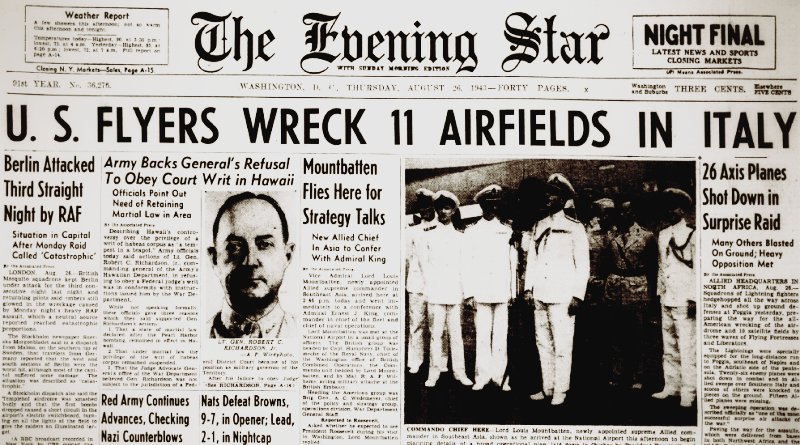World War II Chronicle: August 26, 1943
Click here for TODAY’S NEWSPAPER
The front page reports that the Commanding General of the Army’s Hawaiian Department, Lt. Gen. Robert C. Richardson Jr., has ignored an order from a federal judge. Richardson is also the Military Governor of the Territory of Hawaii, where the right of habeus corpus was suspended on Dec. 7, 1941. The judge was ordering him to hand over two German Americans held in military custody, which Gen. Richardson refused.
His son Robert III was the officer who ordered an American bomber to attack a surfaced German U-boat flying the Red Cross as it carried hundreds of shipwrecked passengers to safety. Robert was never brought into court over the incident, which led to more loss of life than the sinking of Titanic 30 years previous. Robert III did, however, become an expert on nuclear warfare during the Cold War…
George Fielding Eliot column on page eight… Sports section begins on page 12, which highlights the 27-7 pounding the College All-Stars gave to the Washington Redskins last night.
Roving Reporter by Ernie Pyle
SOMEWHERE IN SICILY — At one time in central Sicily we correspondents were camped in a peach orchard behind the country home of an Italian baron. Apparently the baron had skadoodled as royalty is want to do before the fighting started as German and Italian troops had been occupying the place before we came.
The baron had built himself a big stone house that was pink and palatial with a marvelous view over miles of rolling country. It had the usual royal peacocks strutting around but not a bath in the place. The dining room ceiling was hand painted and the staircase gigantic, yet the royal family used porcelain washbowls. It was the perfect shabby rocco domicile of what H.R. Knickerbocker calls “wretched aristocracy of Europe.”
While the baron lived in this comparatively luxury his employees lived in sheds and even caves in the big rocky hill just back of the house. They looked like gypsies.
When we arrived the interior of the castle was a wreck. I’ve never seen such a complete shambles. Every room was knee deep in debris. The enemy had thoroughly looted the place before fleeing. And servants gave us the shameful news that most of the looting and destruction was done by Italian soldiers rather than German.
They’d gone through the house shelf by shelf, drawer by drawer. Expensive dishes were thrown on the tile floor, antique vases shattered, women’s clothes dumped in jumbled heaps, pictures torn down, medicine cabinets dashed against walls, dressers broken up, wine bottles dropped on the floor, their contents turning the trash heap into a gooey mass as it dried.
It was truly the work of beasts. We tiptoed into the place gingerly, suspecting booby-traps but finally decided it had not been fixed up. Then some of us rummaged around the debris seeing in anything left was worth taking as souvenirs. As far as I have seen Americans have been good about not looting. Usually they take only what is left from the Germans’ and Italians’ destruction or what the inhabitants voluntarily give them. All I could salvage were a few pieces of lace from the Baroness’ sewing room floor.
Then we decided the dining room was the least messy place in the building so we set to with grass brooms and shovels and water and cleaned it up. Thus it became our press room. The Signal Corps ran wires from a portable generator and gave us light so we could work by night.
One day I was writing while the other correspondents were away and a stray soldier peered in after having wandered in astonishment through the jumbled house.
He asked, “What is these barons, anyway? Is they something like lords in England?”
To avoid a technical discussion, I told him that for all practical purposes they were somewhat along the same line. He went away apparently satisfied.
Our orchard bivouack behind the castle was fine except for one thing. That was the barnyard collection which surrounded us. About an hour before dawn we were always awakened by the most startling orchestra of weird and ghoulish noises ever put together. Guinea hens would cackle, ducks would quack, calves bawl, babies cry, men shout, peacocks jabber and turkeys gobble. And to top it all a lone donkey at just the right dramatic moment in this hideous cacophony would let loose a long sardonic hee-haw that turned your exasperation into outlandish laughter.
The baron’s servants were a poor looking lot, yet they seemed very nice. Their kids hung around our camp all day, very quiet and meek. They looked at us so hungrily we couldn’t resist giving them cans of food. We tried to teach them to say grazia or thanks in Italian but with no success. One day some of us correspondents were doing our washing when one of the Sicilian women came up and took it away from us and washed it herself. When she finished we asked her “How much?”
She said, “Nothing at all.” We said, well, then, we’d give her some food. She said she didn’t expect any food, that she was just doing it for us free but we gave her some food anyway.
Stories like that are countless. The Army engineers tell me how the Sicilians would come up where they were working, grab shovels and start digging themselves and refuse to take anything for it. Whatever else you can say about them the Sicilians don’t seem lazy. One soldier summed it up when he said “After living nine months with Arabs the sight of somebody working voluntarily is almost too much for me.”
Evening star. (Washington, D.C.), 26 August 1943. Chronicling America: Historic American Newspapers. Lib. of Congress.
https://chroniclingamerica.loc.gov/lccn/sn83045462/1943-08-26/ed-1/
